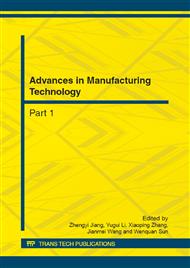p.1175
p.1181
p.1186
p.1190
p.1199
p.1203
p.1207
p.1212
p.1217
The Research of Predictive Control Algorithm for the Three-Tank Water Level System Based on the Multi-Model
Abstract:
Three-tank water level system has the characteristics of nonlinear, large time delay, time-varying parameters, and the system is broadly representative in the research of non-linear and inertial process control. For the controlled object’s strong-nonlinear characteristic when the liquid level given value changes, a multi-model predictive PID cascade control strategy was presented to improve response performance of the control system. On the basis of analyzing the dynamic characteristics of the object, multiple sub-model of the object was established, and a global approximate model of the complex object was obtained as the predictive model by the weighted sub-model. Owing to the rapid response characteristic of PID control, we built the predictive control PID cascade control system by combining PID algorithm with predictive control. The experiment results show that the control algorithm can achieve good tracking control, and greatly improve dynamic and static performance of the system.
Info:
Periodical:
Pages:
1199-1202
Citation:
Online since:
November 2012
Authors:
Keywords:
Price:
Сopyright:
© 2012 Trans Tech Publications Ltd. All Rights Reserved
Share:
Citation:


